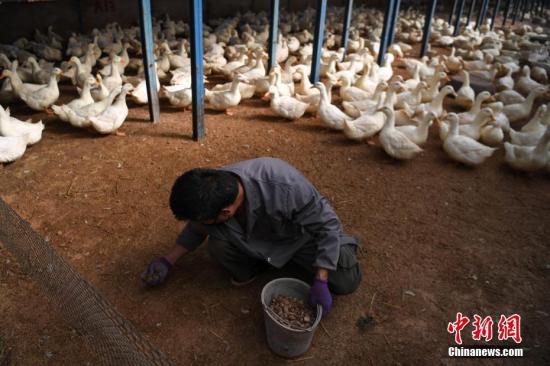(Countering New Crown Pneumonia) China's Duck County "Resuscitation": Striving to Meet "Phoenix Nirvana"
China News Agency, Kunming, March 4th, title: "Revival" in China's Duck Farming County: Striving to Meet "Phoenix Nirvana"
China News Agency reporter Hu Yuanhang
In the early morning, while most people were still asleep, the slaughterhouse in the north of Yiliang City, Yunnan, was busy: batches of cherry valley ducks were sent to the assembly line for processing. In a few hours, they will be transported to various parts of Yunnan, and become the traditional famous dish "Yiliang Roast Duck" with a history of more than 600 years.
On March 3, breeding ducks on the farm. Photo by Kang Ping, China News Agency
"In the past, Yunnan people would eat about 150,000 Yiliang roast ducks every day. Today, this data is gradually recovering." Said Li Chenghua, the leader of Yiliang Duck Industry Association and general manager of Yiliang Li Roast Duck Food Co., Ltd.
The duck business in Yiliang, a county in duck farming affected by the new crown pneumonia epidemic, has ended a short shutdown and is up and running again.
On March 3, a staff member cleaned up the duck farm. Photo by Kang Ping, China News Agency
Yiliang County, located in the suburbs of Kunming City, has the reputation of being the grain warehouse of Yunnan and the hometown of roast ducks. It once broke the Guinness World Records by "simultaneously firing 3192 roast ducks weighing 3689.68 kilograms". Affected by the epidemic, the county's traffic was temporarily interrupted, and nearly a thousand duck farms, duck slaughter plants, duck product processing enterprises, and roast duck catering enterprises were shut down.
Breeder Zhao Yayun described the state of mind during this time as a "roller coaster": before the Spring Festival, he was full of anticipation to prepare for the upcoming peak sales season; who knew that the epidemic had suddenly struck and sales were interrupted. The 20,000 ducks in its inventory could only He was stranded in a duck farm; then, the feed ran out, and he was so anxious that he couldn't sleep all night; until February 20th, as the epidemic situation improved, Yiliang resumed full traffic, and Zhao Yayun "hanged for a month and finally lost his heart Come down. "
On March 3, a worker transported feed to the farm. Photo by Kang Ping, China News Agency
"This is the biggest crisis I have had in raising ducks for 28 years." Zhao Yayun admits that if the epidemic is not quickly controlled, Yiliang and even the farming retail farmers across the country will face a "life test."
In response to the shortage of the feed industry and other difficulties in the breeding industry, the Ministry of Agriculture and Rural Affairs has issued multiple emergency notices in conjunction with relevant departments, requesting "five shalls and one support", that is, it is not allowed to intercept young animals, young birds, breeding animals, feed, and livestock products. Closing slaughterhouses shall not close the roads of villages, support enterprises to resume work as soon as possible, and maintain the normal order of production and marketing of animal husbandry.
On March 3, a worker was at work. Photo by Kang Ping, China News Agency
According to the latest data, as of March 2nd, the number of 9711 feed-issued feed companies nationwide has started 7,807, an increase of 6,537 from February 6, and the operating rate has reached 80%.
Yiliang, with a lower risk of the epidemic, was the first to recover from the "frozen" aquaculture industry. On the 4th, the reporter saw at the local leading duck enterprise "Nanchen Ducklings" that more than 20 fully-automatic incubators have been turned on to continuously hatch ducklings in order to meet the market demand. The duck slaughterhouse of Shancheng Cheng's family slaughtered nearly 10,000 animals that day. At present, more than 240 individual duck farmers in the county have resumed normal operation.
On March 3, staff inspected duck eggs. Photo by Kang Ping, China News Agency
"For us, when we turn around, we see hope." Zhao Yayun said that at present, despite the difficulties in the aquaculture industry, everyone can see clearly that there will be gaps in the back, so they will cling to their teeth.
"After the epidemic situation is clear, we may soon be in an outbreak period." Li Chenghua added that the impact of the epidemic on the breeding industry and the Chinese economy is temporary and temporary. He has confidence in the development of the industry and the Chinese economy.
However, Li Chenghua also frankly said that the epidemic would wash away many small, scattered and weak breeding enterprises. The next step is to strengthen the scale and integration of operations.
On March 3, Yiliang roast duck was brought to the table. Photo by Kang Ping, China News Agency
"Yiliang, located in a mountainous area, has a small intensive breeding industry. However, with the golden sign of" Yiliang Roast Duck ", we also have our own model: instead of selling frozen ducks, we sell fresh ducks to various roast duck shops. According to Li Chenghua, in response to this characteristic, in recent years, the local community has actively explored the development model of companies + bases + farmers, both implementing partial intensification and "turning around small ships" to reduce the impact of the epidemic to a certain extent.
"In the next step, we will further improve the county's cold chain and centralized slaughtering production lines and other equipment to accelerate the pace of integrated operations. At the same time, we will further standardize the material standards and processes of Yiliang Roast Duck, and polish this golden sign." Li Chenghua said that phoenix nirvana for poultry farmers has just begun. (Finish)

